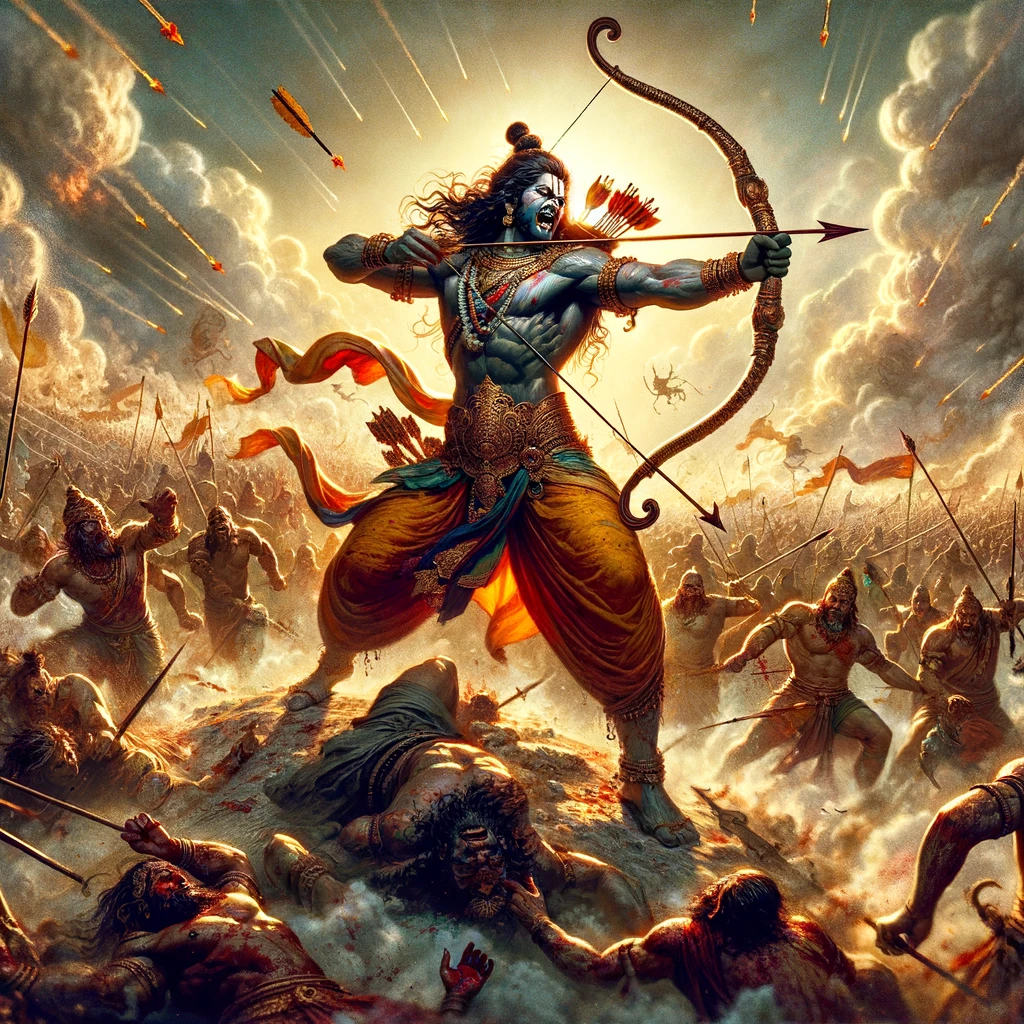Entering the assembly hall, the miserable and grief-stricken king sat down on the main seat, snorting like an angry lion. Afflicted by his son’s death, the mighty Ravana spoke as follows with joined palms to those army leaders: “All of you march with your armies of horses and elephants, chariots and foot soldiers! Surround Rama on the battlefield, shower Him with arrows like clouds during the monsoon and kill Him!” Otherwise, I shall kill Him tomorrow as the world watches, after you have torn His limbs with sharp arrows in combat.”
After receiving this command from Ravana, the Rakshasa commanders sallied forth in swift chariots, accompanied by their troops. They hurled deadly iron clubs, sharp lances, swords and axes at the monkeys. The monkeys hurled trees and boulders back at the rakshasas. As sunrise approached, that terrifying battle between the monkeys and rakshasas became tumultuous. The monkeys and rakshasas then began striking their adversaries with dazzling clubs, spears, swords and axes as they fought. The shocking thing was that as the battle raged on, the dust raised by the fighting settled on the streams of blood from the monkeys and rakshasas. With elephants and chariots as their banks, arrows for their fish, flags as trees and cadavers as logs, rivers of blood flowed.
Then all the monkeys, bathed in blood, jumped about on the battleground destroying flags, armor, chariots, horses and all kinds of weapons. With their sharp teeth and claws, the monkeys tore off the hair, ears, noses and bows of the rakshasas. One hundred stalwart monkeys assailed every single Rakshasa on that battlefield, as birds rush towards a fruit-bearing tree. Then, using heavy maces, spears, swords and axes, the rakshasas struck down those formidable monkeys. While being slaughtered by the rakshasas, that great army of monkeys sought the shelter of Lord Rama, who was worth taking shelter of. Grabbing His bow and entering the Rakshasa army, Rama then rained arrows down on them. The fierce rakshasas dared not approach Rama, who was burning them with His arrows while in their midst, as clouds dare not approach the sun in the sky.
Those night-stalkers saw during that conflict Rama’s most dreadful deeds, difficult to be performed by anyone else, only after He had already performed them. They were unable to see Rama dispersing the great army or killing the great chariot warriors, any more than one can see the wind blowing in the forest. They saw the army rent and smashed, consumed and broken by Rama’s sharp arrows, but they could not see Rama, who was fleet in action. They could not see Rama striking their bodies, any more than one can see the living self experiencing the sense objects. Crying out: “Here is Rama destroying the army of elephants!” “Here is Rama destroying the chariot warriors!” “Here is Rama destroying foot soldiers and horses with sharp arrows!” all the rakshasas saw in their fellow rakshasas some similarity with Rama and therefore attacked each other.
Bewildered by Rama’s use of the ultimate weapon of the Gandharvas, the rakshasas could not see Him, even though He was consuming their army. The rakshasas saw thousands of Rama’s during that great conflict, and then again, they saw just one Rama. They could see the swaying ends of Rama’s golden bow, which resembled a twirling firebrand, but they could not see Him. Living beings saw Rama as a discus that was annihilating the rakshasas on the battlefield like the wheel of time. His body was the hub of the discus, His strength, its flames, His arrows, its spokes, His bow, its felly, the twang of His bowstring, its whirling sound, His energy, intelligence and other qualities, its effulgence, His divine weapons, its edge. Within an eighth of daytime, Rama had destroyed single-handed with His fire-like arrows an army of rakshasas capable of changing their forms at will. The army had consisted of ten thousand chariots as swift as the wind, eighteen thousand fleet elephants, fourteen thousand horses with riders, and a full two hundred thousand foot soldiers.
With their horses killed, their chariots destroyed and their flags broken, those night-stalkers who survived the massacre quietly retreated back to the city of Lanka. With the slaughtered elephants, foot soldiers and horses, the battleground looked like the playground of the wrathful Rudra. Afterwards, gods, Gandharvas, siddhas, and supermost sages offered Rama their respects and shouted: “Well done! Well done!” Then Rama said to Sugreeva, Vibhishana, Hanuman, Jambavan, Mainda and Dvivida: “This divine power of weaponry exists in Me and in Lord Shiva.” The great Rama was just like Lord Indra and was free from the exhaustion of deploying weapons. After He had annihilated the rakshasa army, hosts of gods began praising Him jubilantly.
Thus completes 93rd Chapter of Yuddha Kanda of the glorious Ramayana of Valmiki, the work of a sage and the oldest epic.
Sriman Moola Rama Vijayate


